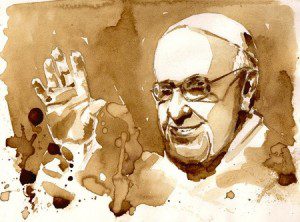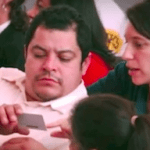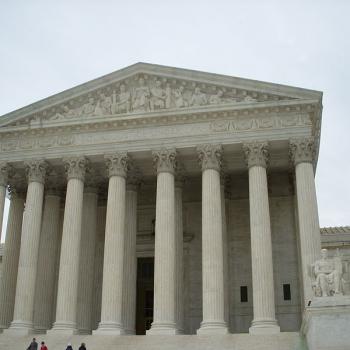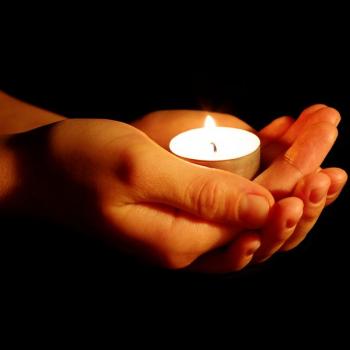
As a cradle Presbyterian and a committed Protestant, it is with some fascination as well a bit of envy that I have watched the meteoric rise of Pope Francis’ popularity over the past two and half years.
As a Jesuit from Argentina, his theology begins with the poor and marginalized and his papal emphasis seems to balance well the purported tensions between justice and mercy. A feat he accomplishes by invoking justice in relation to social structures and institutions that oppress people and by offering mercy in his ministry to believers. As a feminist social ethicist trained in liberation theology and working on issues of social justice as my own vocational calling – he is a Pope after my own heart.
His U.S. visit offers an opportunity for Protestants to think more carefully and more critically about the differences between Protestants and Catholics and about the role of the Christian Church in the world more broadly.
Let me begin by saying that I, in no way, pretend to speak for or on behalf of Protestants. That is kind of my point.
As an ordained minister in the Presbyterian Church (USA), I wouldn’t even try to speak on behalf of Presbyterians, even my branch of them. Even in my role as the PCUSA’s appointed representative to the Faith and Order Commission of the World Council of Churches, the only official international body where Protestants, Roman Catholics, and Orthodox representatives sit together to talk about how to overcome the barriers that separate us in order to achieve Christian unity – even in that context, I speak only for myself as an ordained Presbyterian pastor and a representative of my church.
Now, to be sure, the Pope does not sit on the Faith and Order Commission but sends his representatives as well. But if the Pope sat on the Commission, he could speak on behalf of the Catholic Church while there is no one in the Presbyterian Church invested with the same kind of ecclesial or moral authority.
As a feminist, I see this difference between our ecclesial structures – the difference between a hierarchy of power and authority and a sharing of power and authority – as one of the most important differences between Catholics and Protestants (of course, the ordination of women ranks pretty high as well!). While there are a wide variety of ways that Protestants have gone about sharing power and authority, I will use Presbyterianism as one example.
Presbyterian polity (church governance) is radically egalitarian. The theological undergirding of our polity is the belief in the “priesthood of all believers.” This means that all Christians are recognized as “priests” in that we are all called to minister to one another. On many Presbyterian church bulletins, you will see the names of the individual pastors who serve that church but the congregation is identified as the “ministers.”
Our governing bodies – presbyteries (local), synods (regional), and general assembly (national) – include equal numbers of teaching elders (pastors) and ruling elders (laypeople). While pastors/teaching elders must have at least a Master of Divinity degree and are recognized as educated authorities on church history, theology, and scripture – all of our governance is shared between laypeople and trained clergy. This includes the development of our theological statements as well as our public policy work.
In addition to reflecting our theological belief in the priesthood of all believers, this structure is an embodiment of our belief that God works in, with, and through communities of believers as we struggle to discern God’s will for us in the world.
I believe in shared power. I believe that God’s grace and wisdom can and does work through communities of people who carefully, prayerfully, and honestly seek to discern what is good and just, and right – together in good faith. I have seen it happen. I have experienced it happening.
At the same time, the work of community discernment can be slow. And painful. And difficult. And, as Protestants, we are often too prone to “leave” the table and form another church when we disagree with the discernment of the larger community.
As a Protestant, I get that.
There are some things that I believe so deeply and fervently that I, too, would leave a church that denied those beliefs. The abolition of slavery and the insistence on the humanity and freedom of all God’s children seem a worthy place to stake one’s ground. As does the absolute equality and valuation of women in society and as ministers of the Word and Sacrament.
Perhaps that is the Achilles heel of Protestantism, our too ready willingness to part ways when we disagree theologically rather than a ready willingness to wrestle with God and each other over those painfully divisive issues.
This is where the Roman Catholic church has an apparent advantage. As a hierarchical structure, authority is vested in the Pope. Watching the world sit up and pay attention – as he criticizes the overweening greed of our capitalist system, as he puts the world’s poor and marginalized at the center of his agenda, and as he speaks out clearly and forcefully about the moral necessity of addressing climate change – makes me a little envious.
While everything he has said about capitalism, poverty, or climate change has already been said by Christian theologians and ethicists; when the Pope says it – people listen. Of course, politicians, pundits, and economists are scrambling all over themselves to point out that the Pope doesn’t know anything about economics and should stick to saving souls but the fact that he is raising important moral questions about the social structures of our world is impacting the conversation.
It is very much the task of theology and religious traditions to stake out moral touchstones in our world. The values of interdependence, equity, community, the common good, sustainability, and honoring the sacred (among others) are moral touchstones that ought to guide human behavior in the world – economic, social, interpersonal, and political behavior. Religion is not what we do on Sunday (or Friday or Saturday), for religious people, our faith should shape our behavior all the time and our values should define the structures of our society – including our economic structures.
While many theologians, churches, and religious groups have been working on these issues for decades, the Pope commands an authority that is singularly invested in his hierarchal position. His influence is directly related to his position.
Ultimately, perhaps that’s the Achilles heel of the Catholic church. Vesting so much authority and power in one person means that a lot more is riding on the idiosyncrasies, theological orientation, and personal commitments of an individual man in terms of the leadership and vision that he is able to offer to the world. While I happen to like what this Pope has to say, and find myself strangely proud, as a Christian, that he using his position and moral authority to speak a Christian message to the world that I largely support – that hasn’t always been the case.
And so, while I admire this Pope enormously and admit to some serious Protestant Pope Envy when it comes to the moral authority he is able to bear on the compelling issues of capitalism, greed, climate change, and justice in the world today – I’m still persuaded that shared power and authority is a more just political, social, and ecclesial model.












